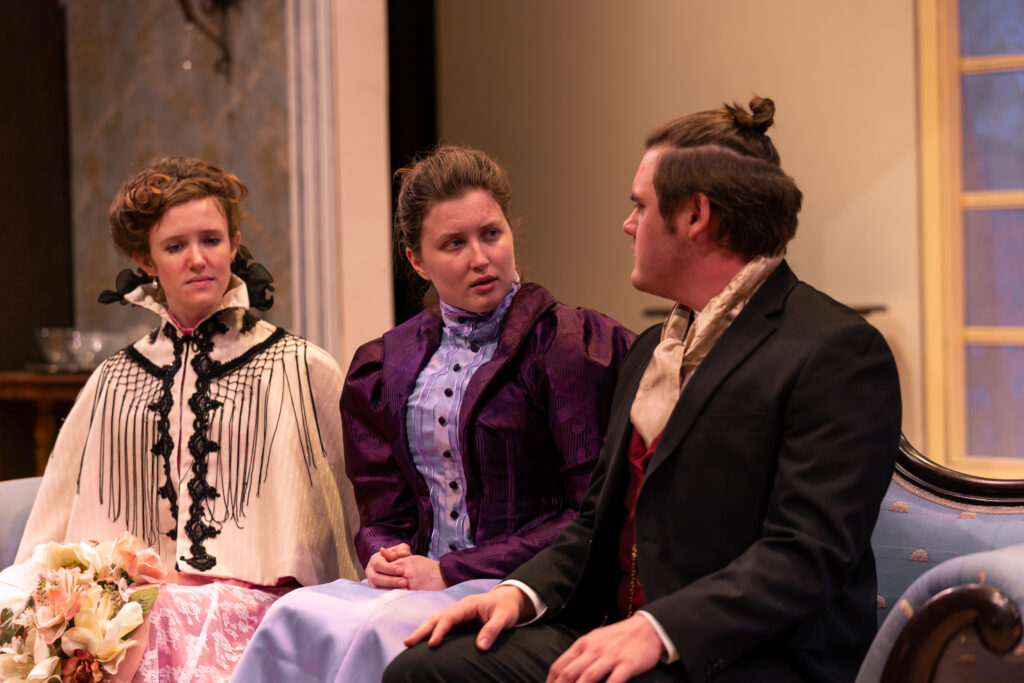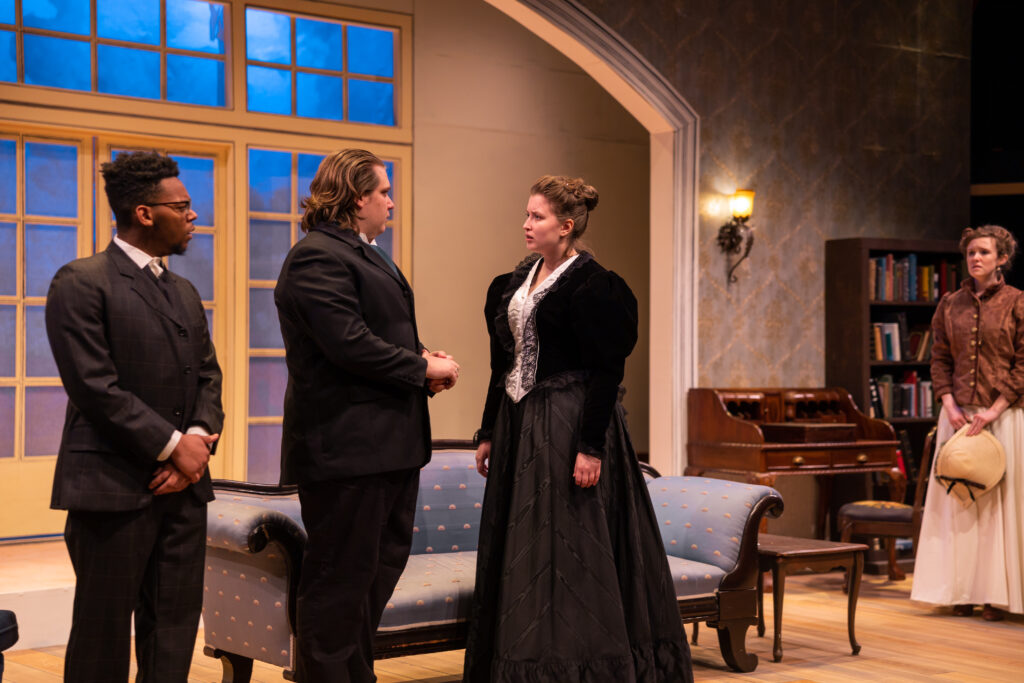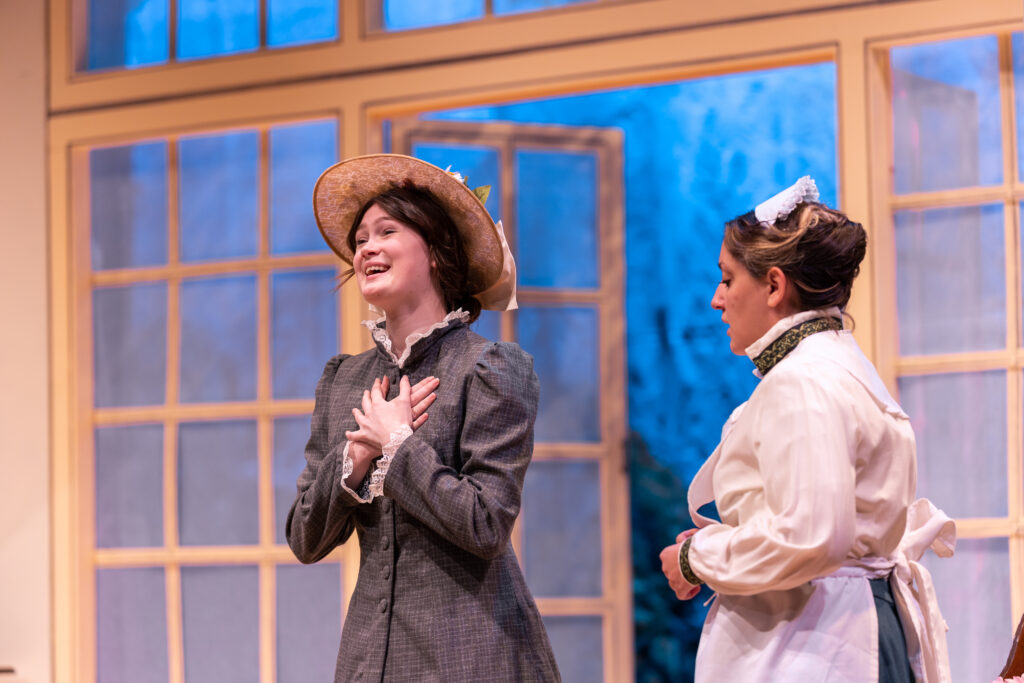Review: “Hedda Gabler” on the Mainstage
By Kieran Caves, Staff Writer

From left to right: Libby Drew ’24 plays Thea Elvsted, Roisin Daly ’23 plays Hedda Tesman (nee Gabler), and Alex Sanchez ’23 plays Ejlert Lövborg in “Hedda Gabler” (Photo Eric Lippe/The Gettysburgian)
Thursday marked the opening night of the Gettysburg theater department’s production of “Hedda Gabler,” by Henrik Ibsen, directed by Adjunct Instructor of Theatre Arts Richard Sautter. This production of Hedda Gabler—a play with only seven actors—is in perfect contrast to last semester’s “Shakespeare in Love” at the Majestic, and the choice to use the intimate Kline Theater reflects this.
Performing an Ibsen play is a bold choice, and yet it is also an extremely apt choice, as Ibsen continues to be one of the most relevant playwrights amidst a changing social landscape which fails to ever truly evolve out of certain trappings, like constricting gender roles, for example.
“Hedda Gabler” is a play about these fundamental social constructs which were just as pressing in Ibsen’s time as they are now; even if we today are more normalized to the fact that these issues are present, his stance is no less necessary, his characters no less exposing of the hypocrisies and inequalities woven into our social fabric.
“Hedda Gabler” follows its titular heroine, played by Roisin Daly ’23, who has recently returned from honeymooning with her new husband Jorgen Tesman, played by Mike Peck ’23, an academic who earnestly tries to give Hedda the world, despite failing to connect with her emotionally or understand her complexities.

From left to right: Mike Peck ’23 plays Jorgen Tesman, Eric Lippe ’24 plays Judge Brack, and Roisin Daly ’23 plays Hedda Tesman (nee Gabler) in “Hedda Gabler” (Photo courtesy of Alex Sanchez)
Then, there is Tesman’s Aunt Julle, played by Laura Duffy ’23, who is alternately taking care of her ill sister and encouraging the Tesmans to start a family. In the opening scene, Duffy is accompanied on stage with Antoinette Chango ’24 who played Berthe, the maid.

Laura Duffy ’23 plays Aunt Julie and Antoinette Chango ’24 plays the maid Berthe in “Hedda Gabler” (Photo Eric Lippe/The Gettysburgian)
Judge Brack, played by Eric Lippe ’24, is a friend of Jorgen’s who supports him financially while supporting Hedda through her disinterest in married life.
There is also Thea Elvsted, played by Libby Drew ’24, also the victim of a boring marriage, who has recently become involved, physically and academically, with Ejlert Lövborg (Alex Sanchez ’23), a passionate academic prone to fits of rage. Lövborg is an old acquaintance of Hedda’s, and his return into her life regenerates her desire for passion and intensity.
Hedda is a character burdened by the confines of a marriage which holds no excitement or meaning for her; under this weight she feels adrift, lacking any control over her life, a state of being which causes her to seek control over others by any means necessary. Daly gives a great performance here, the initial haughtiness of the performance dissolving into a robustly sympathetic portrayal of Hedda which plumbs the depths of her tragic lostness.
Peck nails Tesman’s ignorance, and Lippe’s forceful Judge Brack is properly, in turn, inviting and then terrifyingly oppressive.
The performance of the night, in a night of good performances all around, was Sanchez’s Ejlert Lövborg. Lövborg, both the tormentor of Hedda’s heart and the object of her manipulation, could easily be lost in his drunken shouting, but instead, Sanchez brings an emotional depth and urgency which shakes the whole work alive; the raw, unhinged performance invites an emotional investment that, according to the general buzz after the lights went up, was much appreciated by the audience.
But as intense as the production was, the actors were also quite successful in drawing out the comedy in Ibsen.
Duffy as Aunt Julle insinuating that Tesman should consider his fatherly prospects as well as his academic ones produced laughs from the whole crowd, something which is both necessary and quite difficult to do within a text like “Hedda Gabler.”
Drawing out the relevant comedy was only one of the ways in which the production acclimatized the text to a contemporary landscape; the actors also adopted an intriguing delivery to some lines which can only be described as distinctly modern.
In particular, there is a scene in which Hedda and Brack are laughing about how Tesman would fare in politics, and the actors’ delivery really draws out the gossipy, bantering nature of the lines while still being faithful to the text.
There’s also some great blocking work, as in the scene which follows Brack’s proposition to Hedda of allowing him to become the third side to a triangular kind of relationship: Hedda, Tesman, and Brack all partake in a toast, standing in a very deliberate triangle, even the glasses in the toast are held for an extra second to emphasize the triangularity. It’s obvious enough to be striking, but not so overdone as to elicit eyerolls. It seems just the kind of thing Ibsen, as a sort of symbolist playwright, would have enjoyed, even though it is not explicitly mandated by the stage directions.
Both the director and the actors have clearly taken pains to understand how Ibsen remains important in today’s social landscape, something which shines through in the production; but far from being some adulteration of “Hedda Gabler,” this is an honest, faithful portrayal of a play whose social commentary remains biting and insightful in the 21st century.
In all, the production is also evidence that Ibsen belongs on the college stage, and that student audiences will appreciate texts like this when they are treated properly. The audience reaction was almost fully positive, even from members who might never have heard Ibsen’s name two hours earlier. That’s an impressive feat, and one which I primarily attribute to the energy and emotional resonance of the actors.
A previous version of this article misspelled “Tesman” and Richard Sautter’s last name and did not include his title (- K. Oglesby).
